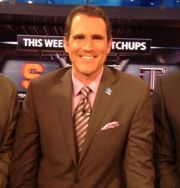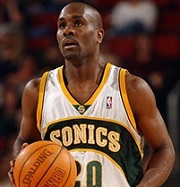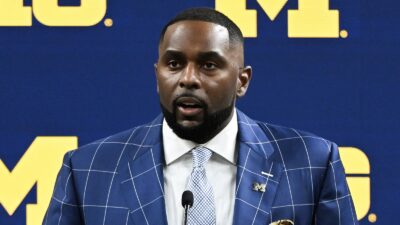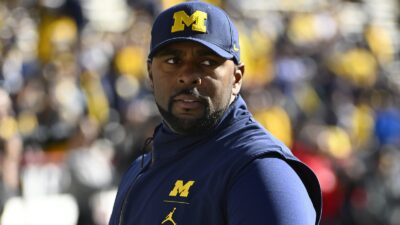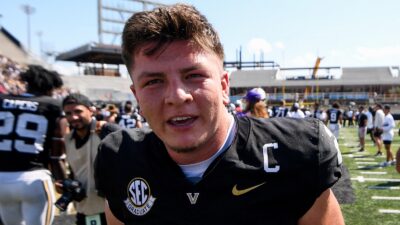 A little over two months ago we told you about Wake Forest baseball coach Tom Walter who donated a kidney to his player, Kevin Jordan. We were stunned by the generosity behind the move and the decision for Coach Walter to give up an important organ for a player he hardly knew.
A little over two months ago we told you about Wake Forest baseball coach Tom Walter who donated a kidney to his player, Kevin Jordan. We were stunned by the generosity behind the move and the decision for Coach Walter to give up an important organ for a player he hardly knew.
Ever since donating his kidney, Coach Walter has been helping to raise awareness for kidney disease and organ donation. He says he’s feeling great and that Kevin is progressing well in his recovery. We had a chance to speak with Coach Walter on behalf of National Donation Life Month and we encourage you to visit www.kidney.org for more information on organ donation.
Our conversation with the heroic Coach Walter follows.
LBS: How has your life changed since you donated the kidney to Kevin?
TW: Well it’s certainly changed in terms of recognition. People are still sending emails and letters and calling, which has been great. Often times they share their stories of how organ donation has affected their lives in a positive manner, so that’s been an unexpected but very nice side effect to all this.
And then personally I’m more aware of organ donation as a whole and the need to increase awareness. My desire to be involved has grown exponentially.
LBS: Do you think it’s changed the team at all, like in a way that it brought people together more?
TW: We were a pretty close-knit group before this, but if anything, it made us more aware of the value of sacrificing for one another.
LBS: How is your recover coming along since the surgery?
TW: Everything has been pretty seamless. I’m back to exercising, my diet hasn’t changed, I’m not on any medication, so I’d say I’m 100% back to normal.
LBS: I got an email explaining some of the tips for being a donor and one of the things they said is that donating an organ can be one of the most rewarding experiences of a person’s life. Has it been that way for you?
TW: Without question. Just seeing Kevin Jordan and his improvement has given me a great sense of satisfaction. Kevin went from being 198 pounds when we recruited him down to 158 pounds when he arrived on campus. Now he’s back over 185 and he’s back swinging a bat and running sprints and lifting weights. Just the fact that you’re able to help a young man change his life is reward enough.
LBS: What’s Kevin’s timetable like? Is he supposed to be back to full strength by the summer and be ready to be with the team in the fall?
TW: That’s the plan. I don’t think anybody knows how his body is going to react to all of this and if he can get back to his original form, that would be a great bonus. But just being a normal student and not being hooked up to a dialysis machine would be great. Next year he can have a roomate and just be a normal college student, and if the baseball happens great. And if doesn’t, then so be it. That’s the timetable.
LBS: I read about him still going to school, still going to classes despite having all that dialysis and all those problems. The character he displayed, did that make you want to help him out even more?
TW: Well, I feel as though I would have done it for anybody on my team truthfully. But the fact that Kevin is the person he is certainly made it more gratifying. He certainly embodies courage, strength, and character. We can all learn a lot of valuable lessons from Kevin. While I would have done it for any one of our team members or coaches or anybody in the Wake Forest athletic department for that matter, it certainly is more gratifying because Kevin is who he is.
LBS: I’m really in awe of what you did. For myself, I know I really would have wanted to help, but I probably would have had second thoughts down the road and wonder what I got myself into. Did you ever have any of those second thoughts?
TW: I really didn’t, I made up my mind very early that if I could help I would, and then I just left the rest up to the doctors. I was getting assurances every step of the way that they wouldn’t let me do it if they didn’t think I would make a full and complete recovery, so I just put my faith in their hands. At no point did I have any reservations about it from day one.
LBS: I know you said you’ve been getting a lot of emails and letters from people sharing their stories. Has there been any difference in the visibility of the program, or maybe the people who are interested in playing for the team now?
TW: I don’t know about that. I do know that certainly when you sit down with a young man and you tell him that ‘at Wake Forest we’re a family, at Wake Forest we make sacrifices for one another,’ I think it gives added credibility to the things coaches say. I know a lot of people have the impression that coaches will do and say anything to recruit someone. Maybe because of all this I’m a little more believable I guess. I don’t know if it’s given us any increased exposure or not, but I’m sure it didn’t hurt.
LBS: Definitely, it’s a sign that whatever you say means something. How is the program doing right now?
TW: Well we have our first recruiting class on campus right now so we’re playing a lot of young guys. We’re playing a lot of freshmen and a lot of sophomores and we’re about where we expected to be. I think as far as being in year two of taking over a program that’s a rebuilding situation, I think we’re about where we thought we would be. We’re certainly nowhere near as good as we think we will be in the near future, but we’re making progress every day.
LBS: I know you also used to coach at New Orleans and managed that program. I can’t imagine what it was like to move around as much as you guys did [because of Hurricane Katrina]. You played at Las Cruces, New Mexico and then Mobile, Alabama what was that like?
TW: In a lot of ways, that was more taxing and nerve-wracking than anything that’s happened here because of all the uncertainty. The only uncertainty here was whether I was going to be a match or not. With the hurricane, it was totally different because there was so much uncertainty. ‘When is campus going to reopen?’ and ‘What’s it going to be like when we get back?’ and you’re dealing with recruits, trying to convince them to come to the school. There was a lot more uncertainty.
We thank Coach Walter for his time and for inspiring us to be more generous and giving with our life. For more information on kidney donation, go to www.kidney.org.


